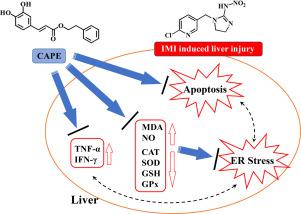当前位置:
X-MOL 学术
›
Pestic. Biochem. Phys.
›
论文详情
Our official English website, www.x-mol.net, welcomes your
feedback! (Note: you will need to create a separate account there.)
Protective effect of caffeic acid phenethyl ester against imidacloprid-induced hepatotoxicity by attenuating oxidative stress, endoplasmic reticulum stress, inflammation and apoptosis
Pesticide Biochemistry and Physiology ( IF 4.2 ) Pub Date : 2020-03-01 , DOI: 10.1016/j.pestbp.2020.01.001 Bo Shao , Meixia Wang , Anran Chen , Chunzhi Zhang , Li Lin , Zhaoqiang Zhang , Anlan Chen
Pesticide Biochemistry and Physiology ( IF 4.2 ) Pub Date : 2020-03-01 , DOI: 10.1016/j.pestbp.2020.01.001 Bo Shao , Meixia Wang , Anran Chen , Chunzhi Zhang , Li Lin , Zhaoqiang Zhang , Anlan Chen

|
Imidacloprid (IMI) is a widely used neonicotinoid pesticide in the world, its environmental and human health risk has particularly attracted the attention of researchers. Caffeic acid phenethyl ester (CAPE), an active polyphenol of propolis, has many pharmacological activities including free radical scavenger, anti-inflammatory, and anti-oxidant. In this study, protective effect of CAPE against IMI induced liver injury in mice was performed. Administration of 1 and 2.5 mg/kg CAPE markedly prevented serum AST and ALT increase in 5 mg/kg IMI-induced mice. CAPE significantly downregulated liver NO generation and lipid peroxidation, and upregulated glutathione, catalase, superoxide dismutase and glutathione peroxidase in a dose-dependent manner in liver of IMI-induced mice. Endoplasmic reticulum stress represented by the swelling of endoplasmic reticulum was observed by transmission electron microscope in IMI group. Pretreatment of 2.5 mg/kg CAPE significantly attenuated the endoplasmic reticulum stress induced by IMI in liver. Western blot analysis illustrated that pretreatment of CAPE downregulated the upregulation of TNF-α and IFN-γ induced by IMI in liver of mice. Moreover, the increase of positive apoptotic hepatocytes further suggested apoptosis might be involved in IMI-induced hepatotoxicity. Pretreatment of 1 and 2.5 mg/kg CAPE significantly decreased positive apoptotic hepatocytes, suggested that CAPE prevented apoptosis in liver of IMI-induced mice. In conclusion, CAPE prevented liver injury in IMI-induced mice via attenuation of oxidative stress, endoplasmic reticulum stress, inflammation and apoptosis. Our findings may have broad biological and environmental implications for future research on the therapeutic strategy to prevent liver injury induced by pesticides.
中文翻译:

咖啡酸苯乙酯通过减轻氧化应激、内质网应激、炎症和细胞凋亡对吡虫啉诱导的肝毒性的保护作用
吡虫啉(IMI)是世界上广泛使用的新烟碱类杀虫剂,其环境和人类健康风险尤其受到研究人员的关注。咖啡酸苯乙酯(CAPE)是蜂胶的一种活性多酚,具有多种药理活性,包括清除自由基、抗炎和抗氧化。在这项研究中,进行了 CAPE 对小鼠 IMI 诱导的肝损伤的保护作用。给予 1 和 2.5 毫克/千克 CAPE 显着阻止了 5 毫克/千克 IMI 诱导小鼠的血清 AST 和 ALT 增加。在 IMI 诱导的小鼠肝脏中,CAPE 以剂量依赖性方式显着下调肝脏 NO 生成和脂质过氧化,并上调谷胱甘肽、过氧化氢酶、超氧化物歧化酶和谷胱甘肽过氧化物酶。透射电镜观察IMI组以内质网肿胀为代表的内质网应激。2.5 mg/kg CAPE 的预处理显着减弱了 IMI 诱导的肝脏内质网应激。蛋白质印迹分析表明,CAPE的预处理下调了小鼠肝脏中IMI诱导的TNF-α和IFN-γ的上调。此外,阳性凋亡肝细胞的增加进一步表明细胞凋亡可能与 IMI 诱导的肝毒性有关。1 和 2.5 mg/kg CAPE 的预处理显着降低了阳性凋亡肝细胞,表明 CAPE 阻止了 IMI 诱导小鼠肝脏的凋亡。总之,CAPE 通过减弱氧化应激、内质网应激、炎症和细胞凋亡来预防 IMI 诱导的小鼠肝损伤。
更新日期:2020-03-01
中文翻译:

咖啡酸苯乙酯通过减轻氧化应激、内质网应激、炎症和细胞凋亡对吡虫啉诱导的肝毒性的保护作用
吡虫啉(IMI)是世界上广泛使用的新烟碱类杀虫剂,其环境和人类健康风险尤其受到研究人员的关注。咖啡酸苯乙酯(CAPE)是蜂胶的一种活性多酚,具有多种药理活性,包括清除自由基、抗炎和抗氧化。在这项研究中,进行了 CAPE 对小鼠 IMI 诱导的肝损伤的保护作用。给予 1 和 2.5 毫克/千克 CAPE 显着阻止了 5 毫克/千克 IMI 诱导小鼠的血清 AST 和 ALT 增加。在 IMI 诱导的小鼠肝脏中,CAPE 以剂量依赖性方式显着下调肝脏 NO 生成和脂质过氧化,并上调谷胱甘肽、过氧化氢酶、超氧化物歧化酶和谷胱甘肽过氧化物酶。透射电镜观察IMI组以内质网肿胀为代表的内质网应激。2.5 mg/kg CAPE 的预处理显着减弱了 IMI 诱导的肝脏内质网应激。蛋白质印迹分析表明,CAPE的预处理下调了小鼠肝脏中IMI诱导的TNF-α和IFN-γ的上调。此外,阳性凋亡肝细胞的增加进一步表明细胞凋亡可能与 IMI 诱导的肝毒性有关。1 和 2.5 mg/kg CAPE 的预处理显着降低了阳性凋亡肝细胞,表明 CAPE 阻止了 IMI 诱导小鼠肝脏的凋亡。总之,CAPE 通过减弱氧化应激、内质网应激、炎症和细胞凋亡来预防 IMI 诱导的小鼠肝损伤。











































 京公网安备 11010802027423号
京公网安备 11010802027423号